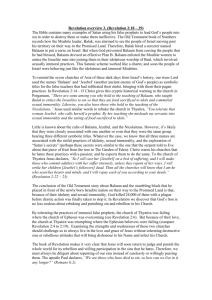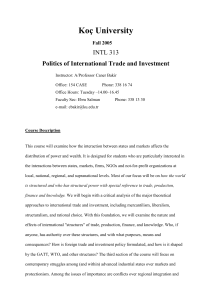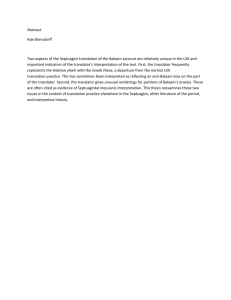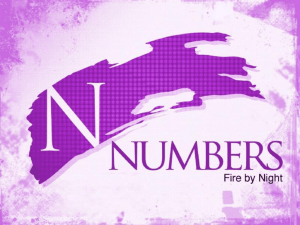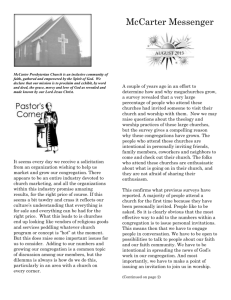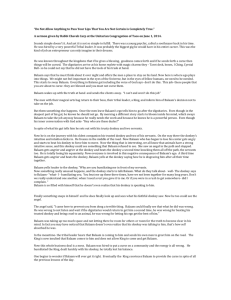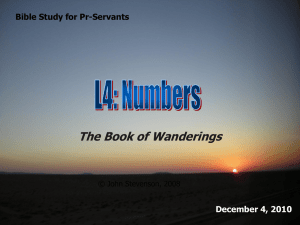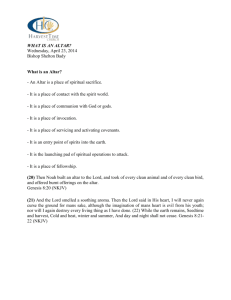Moses Wrote the Five Books of the Torah then Went Back and Wrote
advertisement
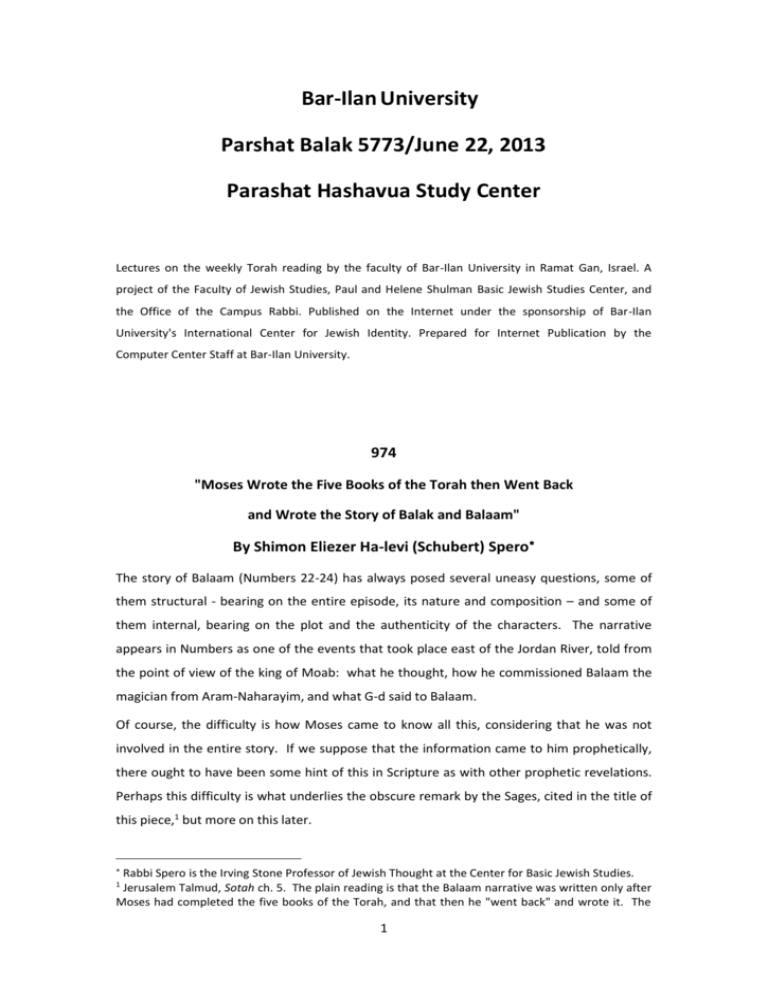
Bar-Ilan University Parshat Balak 5773/June 22, 2013 Parashat Hashavua Study Center Lectures on the weekly Torah reading by the faculty of Bar-Ilan University in Ramat Gan, Israel. A project of the Faculty of Jewish Studies, Paul and Helene Shulman Basic Jewish Studies Center, and the Office of the Campus Rabbi. Published on the Internet under the sponsorship of Bar-Ilan University's International Center for Jewish Identity. Prepared for Internet Publication by the Computer Center Staff at Bar-Ilan University. 974 "Moses Wrote the Five Books of the Torah then Went Back and Wrote the Story of Balak and Balaam" By Shimon Eliezer Ha-levi (Schubert) Spero The story of Balaam (Numbers 22-24) has always posed several uneasy questions, some of them structural - bearing on the entire episode, its nature and composition – and some of them internal, bearing on the plot and the authenticity of the characters. The narrative appears in Numbers as one of the events that took place east of the Jordan River, told from the point of view of the king of Moab: what he thought, how he commissioned Balaam the magician from Aram-Naharayim, and what G-d said to Balaam. Of course, the difficulty is how Moses came to know all this, considering that he was not involved in the entire story. If we suppose that the information came to him prophetically, there ought to have been some hint of this in Scripture as with other prophetic revelations. Perhaps this difficulty is what underlies the obscure remark by the Sages, cited in the title of this piece,1 but more on this later. Rabbi Spero is the Irving Stone Professor of Jewish Thought at the Center for Basic Jewish Studies. Jerusalem Talmud, Sotah ch. 5. The plain reading is that the Balaam narrative was written only after Moses had completed the five books of the Torah, and that then he "went back" and wrote it. The 1 1 In the story itself the difficulties are: Why did G-d initially tell Balaam not to go with Balak's emissaries, but later permit him to go when they returned to him? What lesson are we to learn from the strange tale of an ass that can talk back to its rider? How are we to understand Balak's persistence in building altars, time and again, so that Balaam will curse the Israelites? Most interesting, however, is the personality of Balaam. How could a person condemned by the Sages as evil and corrupt (Avot 5:22) also have been a prophet on whom the "spirit of Gd" rested (Num. 24:22)? To answer these questions we must first understand the general objective and guiding spirit of the narrative. To me its purpose seems to be to poke fun at the superstitious beliefs of the times including sorcery, magic, and assorted aspects of pagan worship.2 Thus irony dominates the entire narrative and the general attitude is far from serious, as we shall see below. When Balaam refused to go with Balak's emissaries on the grounds that G-d had commanded him thus, they most likely smiled to themselves, assuming that Balaam himself had dreamed up the excuse in order to command a higher price. When the emissaries returned and offered him a handsome sum, Balaam told them that this time G-d had granted him permission to go. Balaam was clearly confused, but the delegation understood full well what had happened and thus became further convinced that Balaam was a charlatan. Indeed, G-d changing his instructions to Balaam served to undermine Balaam's selfconfidence, for he had boasted that he "knows the thoughts of the Most High" (Num. 24:16), but it also heightened the expectations of Balak, who thought that whoever demanded such a high price would surely perform as required. Therefore he put pressure on Balaam time and again to try to curse Israel.3 version in the Babylonian Talmud reads, "Moses wrote his book and the Balaam narrative" (Bava Batra 14b), without saying he "went back." According to Rashi on this text, the Sages wished to emphasize that even though "it was not necessary to Moses, or part of the order of his deeds," he included it in the Torah. According to Ritba, the gemara refers to another book about Balaam, written by Moses, which "he wrote at greater length," but was lost. 2 Mockery and laughter were effective weapons in the Torah's battle against idolatry, as we see in the struggle Elijah waged against the prophets of Baal (I Kings 18:10-21; Isa. 44:9-20). The plagues with which the Lord smote the Egyptians also contained a note of mockery. Rashi comments on the verse, "what I have wrought upon Egypt" (Ex. 10:2) as meaning how G-d "made a mockery of" the Egyptians. 3 G-d's revelation to Balaam was not personal: the Lord did not call to him by name, nor did He present Himself as Omnipotent and Omniscient, rather He asked him, "What do these people want of you?" (Num. 22:9). After Balaam explained the objective of Balak's delegation, G-d told him: "You must not curse that people, for they are blessed," and therefore, "do not go with them" (Num. 22:12); 2 The show of the angel appearing along the way, "his drawn sword in his hand" (Num. 22:23), and of the talking ass were designed to further humiliate Balaam in the eyes of the delegation; behold, this she-ass can see that which the famous magician Balaam, who calls himself "the man whose eye is true…who beholds visions from the Almighty" (Num. 24:3-4), cannot see. In my opinion, the entire episode with the ass took place in Balaam's imagination,4 and when the delegation preceding him looked back, they must have been amazed to see an irate Balaam hitting his poor ass for no ostensible reason and to hear this magician, whose very words supposedly had the power to kill, saying, "If I had a sword with me, I'd kill you" (Num. 22:29).5 Indeed, the Sages called him wicked, but in the text he appears only as a "hired professional," ready to curse or bless anyone, with no hint of idolatry in his actions or words. In truth, in that era such sorcery was considered a pseudo-scientific wisdom in its own right, with no connection to the gods.6 According to the biblical text, Balaam behaved with probity, obeying all that G-d told him, and laid out before Balak exactly the limitations G-d had imposed on him. The great irony is that no one believed him, because by the conventional wisdom of the times the power of magicians lay in their knowing how to circumvent the gods. Even allowing that at the moment Balaam did not seem wicked, one could hardly call him righteous; so how could it be that he suddenly became a prophet? According to Maimonides, a low level of prophecy, known as the "holy spirit,"7 was conferred upon Balaam, i.e. the initiative and the words came from Balaam, and divine inspiration only helped him put his thoughts into expression in a precise and pleasing manner. Thus all that Balaam uttered, from his first declamation through his last was according to holy inspiration, and the entire difference between the first two declamations and the last two was that the in other words, there is no point in going to curse them, for that is an impossible mission. This sufficed to put an end to the matter. When the delegation returned, G-d was revealed to Balaam a second time and said: "If these men have come to invite you, you may go with them. But whatever I command you, that you shall do" (Num. 22:20). This is to be understood as follows: 'If, after I have told you that the people of Israel are blessed and that I will not let any curse be put on them, you, Balak, insist on hiring Balaam and putting him in competition with Me, so be it; but we shall see whose word shall prevail! So go with them!' The irony is that the reader knows that Balaam never reported to the delegation what G-d had told him about Israel, and this information never reached Balak. 4 The same way Abarbanel interprets the serpent in the Garden of Eden speaking. 5 Rembrandt's painting, Balaam and the Ass (1626), portrays Balak's emissaries looking amusedly at Balaam striking his ass. 6 Cf. Yehezkel Kaufmann, The Religion of Israel, translated and abridged by Moshe Greenberg (University of Chicago Press 1960), p. 84. 7 Guide for the Perplexed, 2.45. 3 first ones were brought on, in his opinion, by his magical tools (Num. 24:1), whereas the last two were actually his own words. Examining the content of his declamations, we find that generally they were no more than friendly observations, but they could be termed "blessings," like the blessings that Jacob gave his sons before his death, which were more akin to prophetic discernments regarding his sons than blessings in the usual sense of the word: "addressing to each words appropriate to him" (Gen. 49:28). Interestingly, Scripture does not give the slightest hint of Balaam wishing to curse Israel after G-d had revealed Himself to him, and this brings us to the difficulty with which we opened this monograph: how did the story of Balaam come to be part of the book of Numbers? Moreover, in the light of what we have said, it is hard to understand Moses' account of the event in Deuteronomy (23:5-6): "and because they hired Balaam son of Beor, from Pethor of Aram-naharim, to curse you.—But the Lord your G-d refused to heed Balaam; instead, the Lord your G-d turned the curse into a blessing for you, for the Lord your G-d loves you." How so, "to heed Balaam"? It should have said, "to heed Balak"! And where is the curse? That may have been Balaam's intention, but it was not realized. The key to this mystery lies in what happened later. After the Moabite and Midianite women seduced the Israelite men, getting them to sin by worshipping Baal-peor (Numbers 31), the Israelite army went to war against Midian, were victorious and took much booty. Among the slain were the kings of Midian, and Scripture says, "They also put Balaam son of Beor to the sword" (Num. 31:8). We can only surmise why Balaam returned to the area.8 There was a tradition in Israel that Balaam was the one who advised the kings of Midian how to lead the Israelites astray with Baal-peor (Num. 31:16 and Rashi, loc. cit.). Be that as it may, the important point is that Balaam was in Midian at the time, and the Israelites were in touch with him. Today we know that Balaam son of Beor was a well-known folk figure in the ancient kingdoms of the Transjordan.9 In my view, when Balaam was in Midian he must have told them about what had happened to him in Moab and may even have publicized his orations. Wind of all this must have come 8 This comes as a surprise because after the affair with Balak it says, "Then Balaam set out on his journey back home" (Num. 24:25). 9 In 1967, archaeological excavation at Dir-`Ala in the Jordan Valley revealed remains of plaster that had fallen off a wall or a monument, bearing fragments of inscriptions apparently written in the 8 th century B.C.E. and mentioning Balaam bar Beor. The inscriptions are in Canaanite script, and as far as they can be read and translated, the subject matter consists of prophecies, threats of reproof and curses. There seems to have been a long-lived tradition in Transjordan about the prophet Balaam son of Beor. Encyclopedia Olam ha-Tanakh (Numbers) (Revivim), p. 138. 4 to Pinchas (and perhaps Pinchas spoke to him before his death), when he was the anointed priest leading the battle against Midian. Pinchas relayed the information to Moses, who immediately understood the great kindness the Lord had shown Israel and the sanctification of His name implicit in it, for a pagan sage to acknowledge the special status of the people of Israel as the Lord's people. "Moses went back and wrote the story of Balaam and Balak," meaning that he rewrote the story of Balaam in order to add to it and perhaps interpret what he had said in his oration in Deuteronomy, and this revision he put where we have it in the book of Numbers. For the Torah is not strictly chronological. Translated by Rachel Rowen 5
